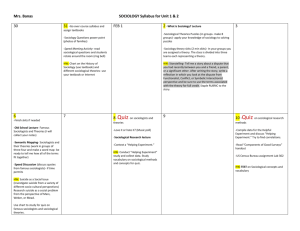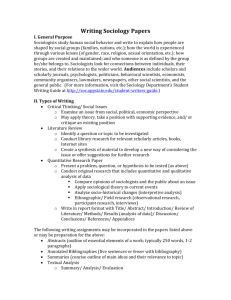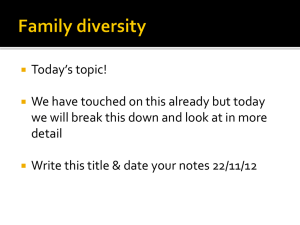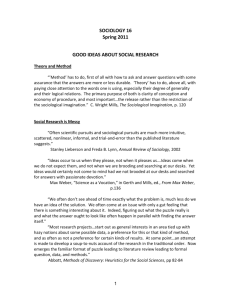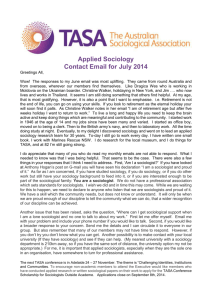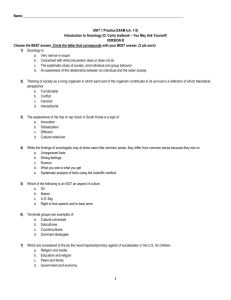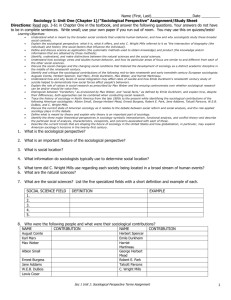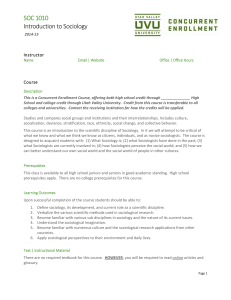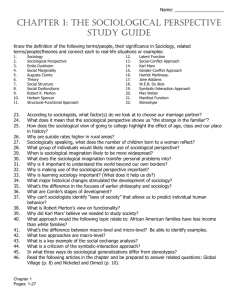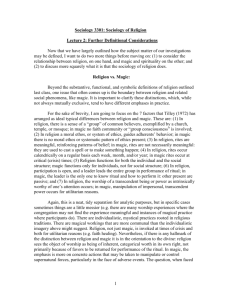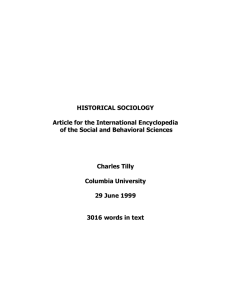Lecture 1: What can social sciences tell us about religion?
advertisement
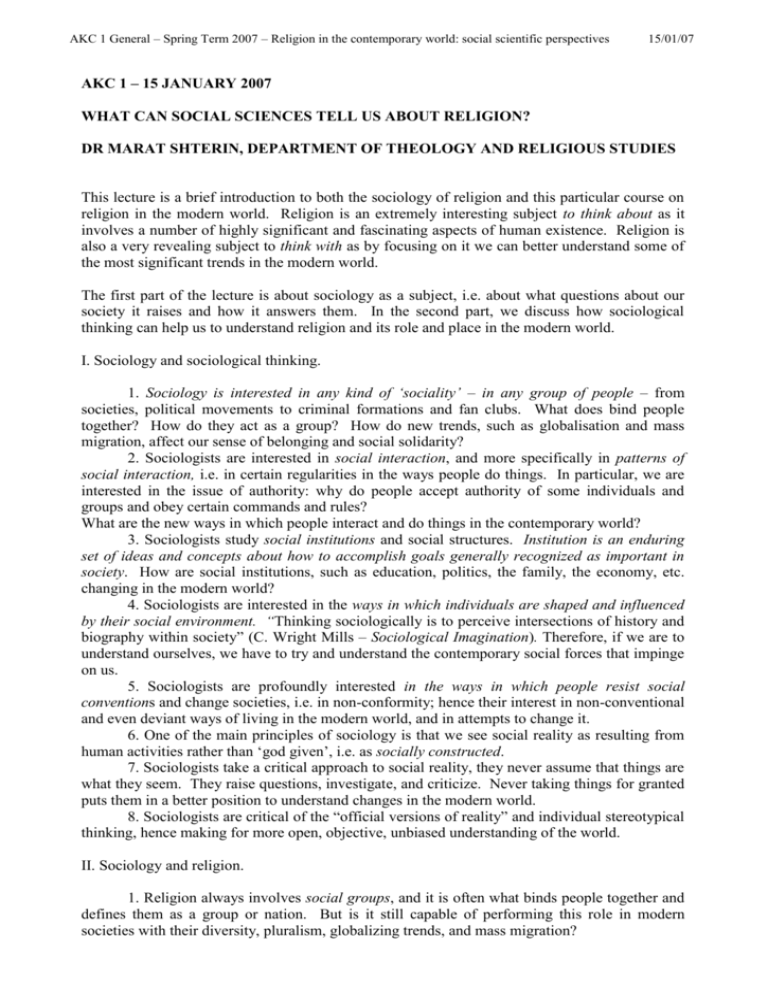
AKC 1 General – Spring Term 2007 – Religion in the contemporary world: social scientific perspectives 15/01/07 AKC 1 – 15 JANUARY 2007 WHAT CAN SOCIAL SCIENCES TELL US ABOUT RELIGION? DR MARAT SHTERIN, DEPARTMENT OF THEOLOGY AND RELIGIOUS STUDIES This lecture is a brief introduction to both the sociology of religion and this particular course on religion in the modern world. Religion is an extremely interesting subject to think about as it involves a number of highly significant and fascinating aspects of human existence. Religion is also a very revealing subject to think with as by focusing on it we can better understand some of the most significant trends in the modern world. The first part of the lecture is about sociology as a subject, i.e. about what questions about our society it raises and how it answers them. In the second part, we discuss how sociological thinking can help us to understand religion and its role and place in the modern world. I. Sociology and sociological thinking. 1. Sociology is interested in any kind of ‘sociality’ – in any group of people – from societies, political movements to criminal formations and fan clubs. What does bind people together? How do they act as a group? How do new trends, such as globalisation and mass migration, affect our sense of belonging and social solidarity? 2. Sociologists are interested in social interaction, and more specifically in patterns of social interaction, i.e. in certain regularities in the ways people do things. In particular, we are interested in the issue of authority: why do people accept authority of some individuals and groups and obey certain commands and rules? What are the new ways in which people interact and do things in the contemporary world? 3. Sociologists study social institutions and social structures. Institution is an enduring set of ideas and concepts about how to accomplish goals generally recognized as important in society. How are social institutions, such as education, politics, the family, the economy, etc. changing in the modern world? 4. Sociologists are interested in the ways in which individuals are shaped and influenced by their social environment. “Thinking sociologically is to perceive intersections of history and biography within society” (C. Wright Mills – Sociological Imagination). Therefore, if we are to understand ourselves, we have to try and understand the contemporary social forces that impinge on us. 5. Sociologists are profoundly interested in the ways in which people resist social conventions and change societies, i.e. in non-conformity; hence their interest in non-conventional and even deviant ways of living in the modern world, and in attempts to change it. 6. One of the main principles of sociology is that we see social reality as resulting from human activities rather than ‘god given’, i.e. as socially constructed. 7. Sociologists take a critical approach to social reality, they never assume that things are what they seem. They raise questions, investigate, and criticize. Never taking things for granted puts them in a better position to understand changes in the modern world. 8. Sociologists are critical of the “official versions of reality” and individual stereotypical thinking, hence making for more open, objective, unbiased understanding of the world. II. Sociology and religion. 1. Religion always involves social groups, and it is often what binds people together and defines them as a group or nation. But is it still capable of performing this role in modern societies with their diversity, pluralism, globalizing trends, and mass migration? 2. Religion always involves social interaction and often defines the ways (i.e. patterns) in which people interact and legitimizes authorities that they follow. What is its role in defining how we interact in the modern world? Is there any place for charismatic leaders in this new world? Do some religions encourage violence while others promote liberalism and democracy? 3. Religion is a social institution. Religious institutions, groups, and belief often have profound effects on shaping individuals and social groups, as religion involves values, norms, and feelings. It affects formation of national and ethnic identities, laws, political views, economic activities, eating habits, marital relations, and career choices. However, is religion still capable of influencing other social institutions in the modern world? 4. On the other hand, society, and in particular modern society, with its laws, and political views also affects and shapes religion. 5. Religion can also be a source of non-conformity and social resistance. Religious deviance has often been a channel for challenging established norms, conventions, and values (recall Jesus from Nazareth, Paul, Muhammad, Siddhartha, etc.). What is the impact of new religious groups and ways of thinking in introducing change in the modern world? 6. As social scientists, we can only observe and interpret those aspects of the religious phenomena that are results of human activity, i.e. socially constructed. “Sociological theory must, by its own logic, view religion as a human projection” (P. Berger). Sociologists do not have to make judgments about truth of religious beliefs, and to accept or reject the content of religious beliefs. An individual researcher can be a believer, or an atheist, or hold a view somewhere in between these positions. However, for the purposes of our research, we set aside our personal opinions about religion and try to be as objective as possible in observing and interpreting the religious phenomenon under study. This approach is often called methodological agnosticism. 7. Sociologists often challenge taken-for-granted views on religion and of religions. This is done on the basis of rigorous empirical and comparative research. On the basis of their research, sociologists can arrive at critical views on some practices within certain religions, e.g. sexism, racism, social exclusion and discrimination, but can also debunk established and biased views on some religions, in particular religious minorities. 8. The critical sociological approach makes for a more open and unbiased understanding of religion and diverse religions in the modern world, in which a large number of religious communities of disparate origins, beliefs, and practices tend to live side by side in one society or even one city. Further reading Aldridge, Alan (2000), Religion in the Contemporary World: A Sociological Introduction, Oxford: Polity Press, Introduction and Chapter One Barker, Eileen, (1989), “And What Do You Believe? Methods and Perspectives in Investigating Religion”, in Burgess, Robert, Investigating Society, London: Longman Berger, Peter and Thomas Luckman (1967), The Social Construction of Reality, London: Allen Lane Penguin Press Markham, Ian, and Ruparell, Tinu, (2001), Encountering Religion, Oxford: Blackwell, Chapter 2 McGuire, Meredith (2000 or other editions), Religion: the Social Context, Belmont, CA: Wadsworth, CC, Chapter One Wilson, Bryan (1982), Religion in Sociological Perspective, Oxford: Oxford University Press, Chapter 1. Full details about the AKC course, including copies of the handouts, can be found on the AKC website at: http://www.kcl.ac.uk/akc. Please join in the Discussion Board and leave your comments. If you have any queries please contact the AKC Course Administrator on ext 2333 or via email at dean@kcl.ac.uk. Please note the AKC Exam is on Friday 23 March 2007 between 14.30 and 16.30. You must register for the course using the form on the website. You will need to register for the exam separately, information will be provided shortly.
